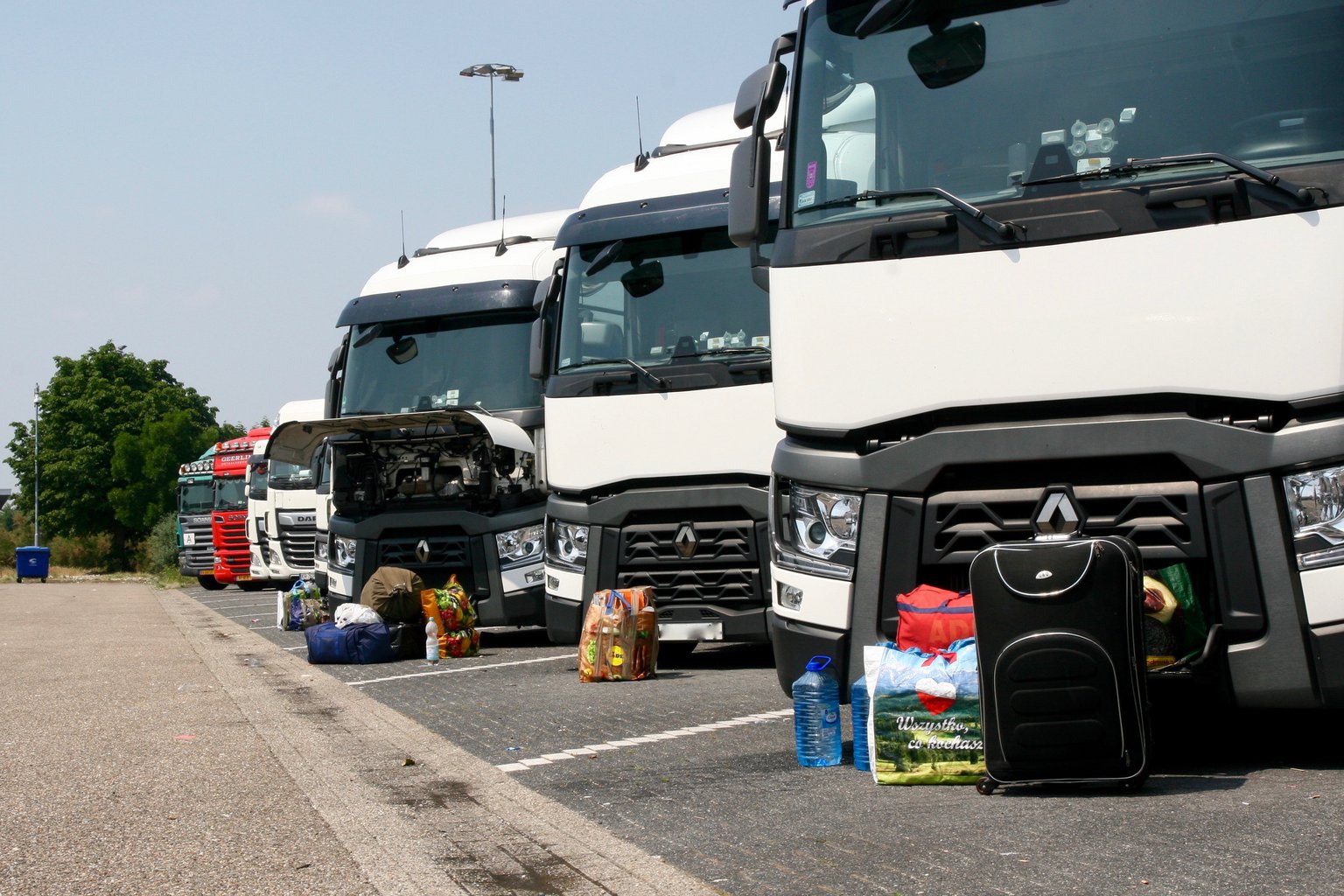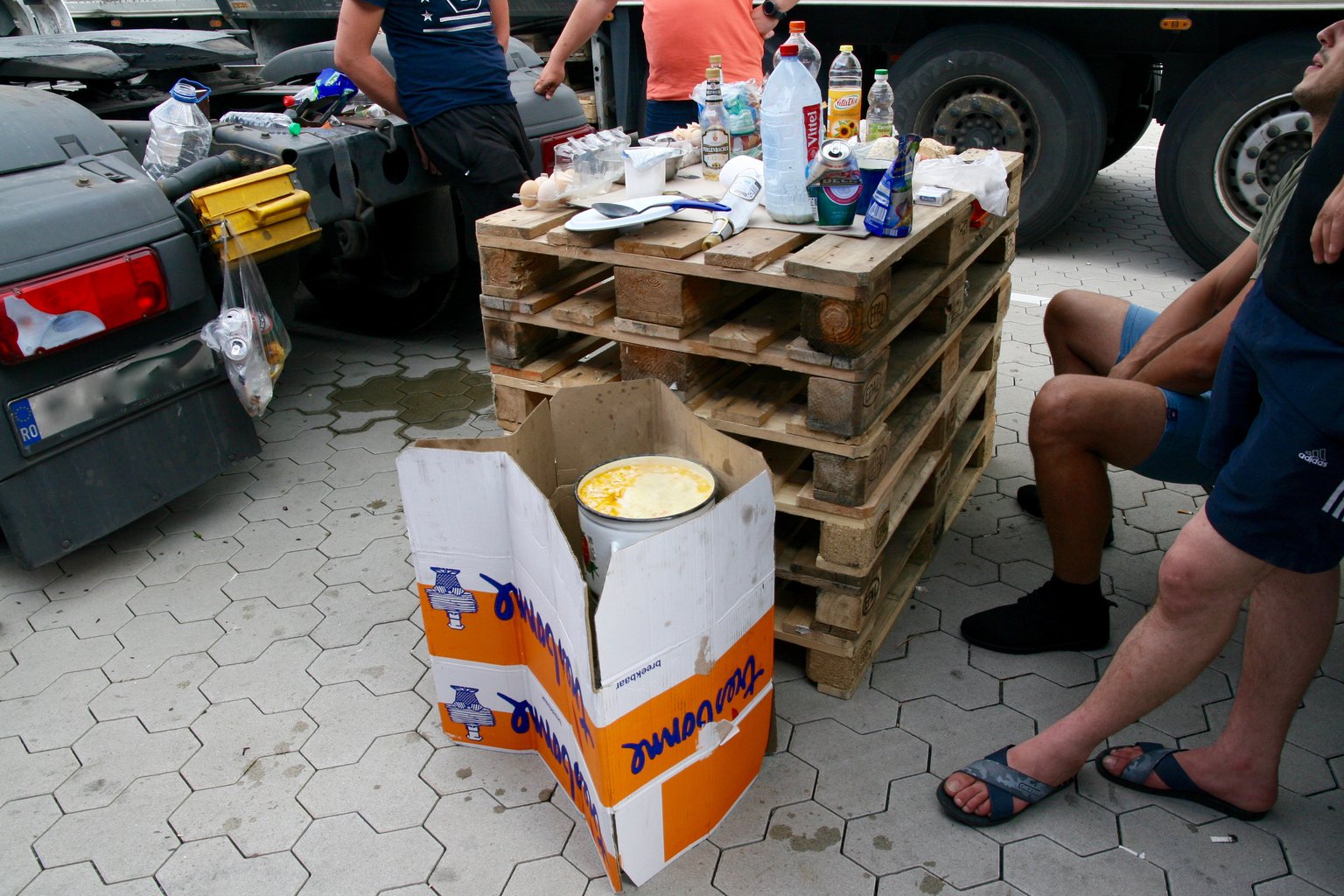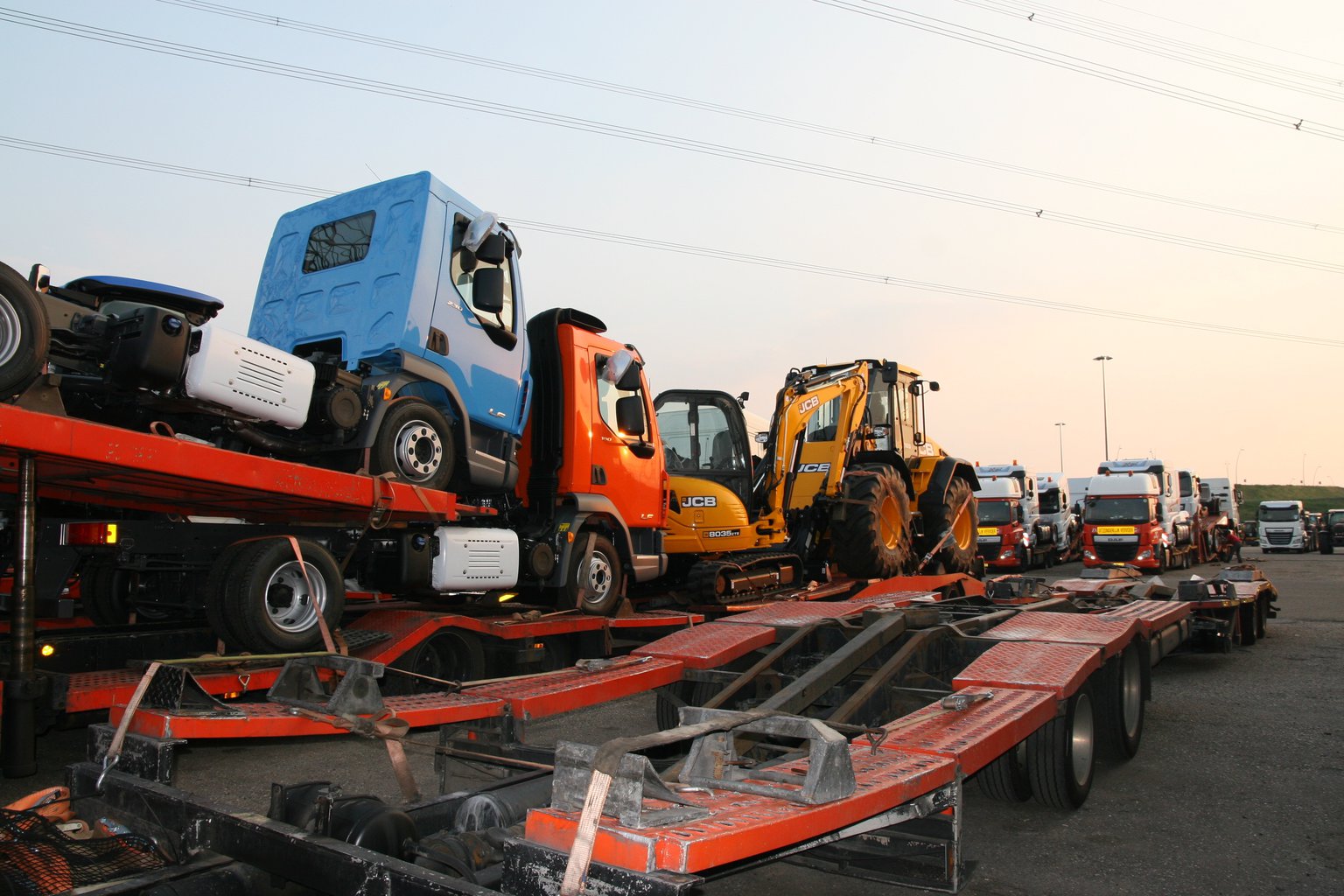Europe’s trucking industry transports cars and vehicle parts within EU member states by exploiting cheap labour from Romania, Moldova, Belarus and Ukraine.
East Europeans are hired through contracts in Romania and Poland, with salaries based on the minimum wage in those countries, even when their jobs include haulage between Spain and Belgium, or the UK and Germany.
At the top of the supply chain are the premium auto brands, who are forcing logistics firms to cut their prices to the smallest fee per kilometer.
Therefore major logistics companies hire Romanians, Moldovans and Ukrainians on east European wages to operate in west Europe.
Not only do east European truckers move to the west - but their salary migrates with them.
This is contributing to a shortfall of 100,000s of jobs in haulage across Europe, as union leaders say the industry sees an endemic rate of “social dumping” - where employers use cheaper labour than is allowed in the countries where they operate.
We are on the road in the logistics belt of the Netherlands. A hot June day. We stop at a truck park, next to a Texaco petrol station. Rows of bright and shining long-distance lorries line up in long alleys. Their doors are shut. In front of the number plates - from Poland, Slovakia, the Czech Republic and Romania - luggage is stacked up.
“We’re going home today,” says Mirko, a tall and dark-haired driver from Belarus in his mid-30s. He’s been on the road for five weeks and is looking forward to seeing his wife and young daughter. When we ask whether he misses his child, he becomes silent.
Mirko was hired by Prime Trans Poland, subcontracted by Ewals Cargo Care, a major haulage company in Europe. He and his co-nationals drive automotive cargo in the West, carrying Mercedes, BMW and Opel vehicles. One also transports Ikea furniture.
Mirko is a non-EU citizen hired by a Dutch company via a Polish business. On paper he has a Polish minimum wage - around 500 Euro, four times higher than in his native country. He adds to this a daily expenses rate, which he saves to make the long haul worthwhile.
But Mirko does not drive heavy vehicles in Poland.
Dark coloured minivans drive up the alley. The drivers crane their necks, checking whether their ride has arrived.
“This one is mine!” Mirko says, as he shakes my hand, grabs his luggage and runs to his ride. This will take him to Poland, where he will pick up his car to drive home to Belarus.
In the car park are Ukrainians. Some are drunk. They spend long hours on the road, in the heat, and have a long period of rest when they drink and eat and then drink some more. Four of them drive white Poland-registered trucks and trailers for Ewals. They say they can drive everywhere across Europe, except in the UK.
At the back of the parking lot is Stefan from Romania. In his 50s, he hauls cars for French group STVA Romania, now part of logistics firm Groupe Cat, via a Romanian company, Benga.
Stefan leaves his country loaded with six Dacia-Renault cars made in Pitesti, south Romania and returns from west Europe with Nissans. He says he drives through many rich EU states, loading and unloading Renault, Citroen and Peugeot models.
He has just transported vehicles from Germany to Belgium and also carries Vauxhalls produced in Germany to the UK market.
“I drive everywhere!” he says proudly.
Even though he operates between countries such as Germany and the UK, Stefan’s lorry is registered in Romania, along with his company and contract. At the end of the month, he cashes in 2,500 Euro, made from the Romanian national minimum wage, 407 Euro, plus daily expenses and bonuses which clock up at over 2,000 Euro.
We leave Stefan in his air-conditioned lorry, waiting to spend his 45-hour weekend rest, and jump into a car with two union reps: Edwin Atema and Daniel Iacob.
Edwin Atema, investigations field officer for Dutch union FNV who collaborates with the International Transport Federation, and Iacob, his colleague from the Dutch transport workers union, is often at his side, as he speaks several languages, including Romanian and Dutch. They both drove trucks for a living, but are now campaigning for better conditions for transport professionals.
We drive to the city of Venlo, where a large truck park has been set up with EU funds. The enclosure, with a capacity to host 255 lorries, is surrounded by barbed wire and has a secure entry gate. After ten minutes, someone lets us inside.
A few drivers turn their backs to us, as Iacob announces that he is with the press, and he wants to keep on their good side. One driver quickly shuts the back doors to his lorry to prevent us from peeking.
During 45 hours of rest, many drivers are sleeping. Some wash their clothes, while others enjoy a drink around a folding table. While a few drivers have lunch at the enclosure’s canteen, a small gang are frying potatoes next to their home on wheels.
Around an improvised kitchen, we meet a group of Ukrainians. They also say they are hired through a Polish company, on a Polish minimum wage, and save their daily expenses, which make up the bulk of their salaries.
Next, we head towards the village of Son, near Eindhoven, where one of Europe’s biggest haulage companies, De Rooy, has a large autopark. De Rooy transports cars, lorries and trucks across Europe.
As we are being led inside the company’s autopark, the immensity of the lorries and the sheer number of orange trucks lined-up against alleys is overwhelming.
De Rooy operates strategic offices or compounds in Romania, UK and Poland, among other locales. Until recently, Romanian drivers were hired on Romanian contracts, with minimum wage and daily expenses. But the company registers all new hires, irrespective of where they operate, in Poland.
“They’ve registered all their trucks in Poland,” says a Romanian driver, “although they’re parked here in Holland. We never work in Poland.”
After interviewing dozens of drivers in one of the major transport hubs in western Europe, it becomes clear: top-of-the-range vehicles for premium auto-brands are transported around west Europe by east Europeans, many not from the EU, on east European wages.
Haulage: A Zero-Sum Game
At the top of the supply chain is a premium auto-brand, which hires a western logistics firm to transport its goods - this firm either subcontracts hiring drivers to a local eastern European company, or opens a subsidiary in countries such as Poland, Slovakia and Romania, where they sign-up truckers on the national minimum wage. But the wages add daily expenses and some bonuses, so the total take-home pay becomes around 2,000 Euro a month.
This is advantageous for a Romanian driver, as it is way above their country’s minimum wage. It is also advantageous for the companies, as they only pay taxes on the minimum wage, with little fiscal burden on bonuses.
“If the company I work for wrote into the work contract what I actually earn - 10,000 RON [2,140 Euro] - the company would pay enormous taxes to the state,” says Sorin, a Romanian driver. “This doesn’t suit the thieves!”
But 2,000 Euro a month is not an acceptable wage for a Dutch or British driver. This “salary migration” from east to west is causing long distance drivers in western Europe to quit the industry, even if work is available. It has led to a shortage of 60,000 drivers in the UK, according to British union Unite.
Now the international road transport business, operated by haulage companies that deliver across the EU, relies almost completely on the often exploitative work of drivers from east Europe.
But this is not just a story of the western EU importing cheap labour from its eastern fringes.
Poland has a shortfall of 50,000 drivers, and there is a “crisis” of availability of long distance drivers in Romania, according to unions and related associations. This means that drivers from outside of the EU are brought into the zone, given a Polish or Romanian contract and salary, and then operate in western Europe.
Poland has become a European hub for non-EU economic commuters. In the past five years, the number of “attestations”, a special license non-EU drivers obtain to drive for a Polish haulage company, has increased over ten times.
Six years ago, the Polish General Inspectorate of Road Transport (GITD) issued over 5,600 certificates a year for drivers who met certain conditions, including completing a course for a large vehicle (CE) driving licence. This year, GITD expects to issue over 70,000.
The number of foreign heavy goods drivers commuting to Europe through Poland is growing astronomically, and over 90 per cent of these drivers are from Belarus, Moldova and the Ukraine.
One French labour inspector we interview who has seen an influx on non-EU drivers on French roads calls this “the Ukrainian phenomenon” which he linkes to the civil war in Ukraine, and its citizens’ need to move abroad for money. “They are very docile,” he says about the Ukrainians, and adds that some of them “will take any kind of work.”
How do companies defend the practice?
Logistics companies are bullish. De Rooy is one firm which hires Romanians on Polish contracts to work in western Europe. When approached, Eugen Stancu, De Rooy Romania’s branch director, says: “De Rooy is a private company that has to stay competitive. As long as De Rooy works on a market where everyone is engaged in the same practice of outsourcing cheaper labour, and it is legal, we have to do the same.”
Meanwhile a representative for Dutch group Ewals added: “We strive to ensure that our day-to-day activities comply with relevant legislation and regulations.“ Regarding the laws on mobile workers, the company says that it “applies not only to employees, but also to subcontractors” and that it has set up a Whistleblower Scheme. The company also acknowledges that “it is difficult to attract and retain drivers in the current market“.
We also spoke to another manager from a Dutch multinational haulage company office in Romania. In his business, auto brands make up the bulk of the company’s customers, including Scania and Volvo.
“A Dutch driver does not work for 2,000 Euro!” he says. “So all multinationals are hiring Romanians, Polish and Bulgarians.“
So what stops him raising the pay of the drivers? “It is our clients,” he claims. “They oppose paying more per kilometre.”
A multinational Romanian branch manager is aware of the shortage of drivers in Europe. “That’s because prices have fallen sharply since the economic crisis [in 2008],” he adds, “and taxes went up. Some countries imposed road taxes after the crisis, where before there were none. In Germany, France, The Netherlands, Belgium, companies cannot pay drivers 3,000 to 4,000 Euro per month like before.”
How do the unions respond?
The problem is cost-cutting, according to Matt Draper is National Officer at major British union Unite, which is responsible for representing the automotive sector, among others.
“With a shortage of 65,000 jobs in the industry in the UK, you would assume that British drivers should be able to print their own money,” says Draper, “but UK drivers do not want to stay in the profession due to the low salaries.”
However British drivers stand little chance of seeing their wages rise.
“One of the biggest issues we have as a trade union is to turn around the anger and resentment at employing eastern European migrant labour, and to demonstrate that everyone in that supply chain is being abused,” adds Draper. “You’re the driver who’s employed by that company. Your wage is being driven down by this east European driver. Should we blame these eastern Europeans? No. Who’s paying, who’s undercutting is the big person at the top. The economic employer who says ‘Cheaper! Cheaper!”
Both Draper in the UK and the European Transport Federation field officer Edwin Atema are certain that social dumping in the automotive transport industry “is endemic”.
“Utilising labour at supposedly their home countries’ rates when they never operate in their home countries, when they’re driving, for example, in the UK, France or Belgium, creates an unfair market,” says Draper.
His solution is not to cut the jobs, but to pay the necessary and transparent rates.
Documents seen by our journalists demonstrate that Jaguar Land Rover, Renault and Volvo, among others, subcontract their logistics services to companies that stand accused by unions of indulging in social dumping. This apparent race to the bottom in haulage sector salaries, blamed on premium car brands, who reside at the top of the supply chain, has led to workforce gaps in many countries.
How do the big auto brands respond?
A spokesperson for Dutch Truck brand DAF & Leyland says: “When operating for DAF, suppliers and contractors are obliged by contract to act according to the national law.” According to him, the brand has started its own “fact finding“ investigation addressing poor driver conditions.
Meanwhile German giant BMW gives a statement: “Every supplier who offers his services to us must meet the BMW Group requirements defined in the sustainability standard and pass these on to his subcontractors. The transport logistics of the BMW Group are complex. In total, more than 100 companies are active for us in inbound and outbound business in Europe.
“All these partners have committed themselves to our sustainability requirements, including compliance with International Labour Organization (ILO) standards. The BMW Group also obliges all suppliers to comply with these standards at subcontractors. We are currently explicitly pointing this out once again to all our partners in inbound and outbound business.”
Europe at Battle
Long-distance drivers are aware they are what is officially called “posted workers”. This is a wage-earner in one country sent by their employer to work temporarily in another country. While abroad, the salary of a posted worker remains based on the country where they have been employed.
Under the EU’s posted workers’ directive, a worker has to be paid the salary and costs of the country where they spend most of their time.
But road transport drivers were left out from this rule because they are seen as “mobile” workers.
On regulating road transport, the EU is divided into camps from the east and west, where the issue falls into the debate of free market versus protectionism.
On the one hand, western EU member governments, organised in the ”Road Alliance”, accuse the east European member states of driving down salaries and working conditions by social dumping for drivers, who are hired either by east European haulage companies or local subsidiaries of their western competitors for low wages and long periods on the road.
On the other side, the ministers and MEPs from the Visegrad countries plus Bulgaria and Romania complain that westerners are ”protectionists”, trying to undermine the single market. This position is understandable, according to German MEP (S&D) Ismael Ertug, when in Bulgaria, for example, 15 per cent of the country’s GDP is dependent on the international transport business.
EU’s Transport Committee (TRAN) has formed suggestions and measures on how their situation can be improved. One proposal is that the posted workers’ salary and other benefits comply with the minimum levels of those in the host country if the posting is longer than three days. But the dispute over fair wages rages on, and a vote in European Parliament on how to include haulage professionals has seen constant postponement.
Meanwhile haulage companies continue to depend further on the labor force from outside the EU to recruit truckers.
All the drivers’ names in this story have been changed to protect their identities
Additional IE members: Wojciech Ciesla, Ingeborg Elisassen, Nikolas Leontopoulos, Maria Maggiore, Leila Minano, Paulo Pena, Harald Schumann, Jef Poortmans, Elisa Simantke.
Investigate Europe (IE) is a pan-European pilot project: a team of journalists who report cross-border on how EU policies impact us all. They publish with mass-media across the continent. IE relies on grants and philanthropy. A group of non-governmental and non-corporate donorsmake this possible. Additional contributions from readers are an important vehicle towards the sustainability and quality of their work. The team also cooperates with Journalismfund and N-Ost.


